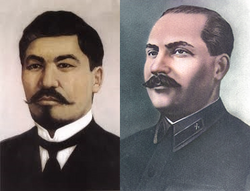Pamiran Federation
Federation of Central Pamiran Republics Markaziy Pomiriya Respublikalari Federatsiyasi | |
|---|---|
| Capital | Burukhand |
| Official languages | Kodeshi |
| Religion | Secular state See Religion in Kodesh |
| Government | Federal one-party socialist republic |
| Nurbolat Ayanul | |
| Morad Askari | |
• Premier | Ashur Batirogil |
| Abdulla Abdulwali | |
| Soliya Hakimogil | |
| Chintamani Parsai | |
| Vakhid Dudayol | |
| Legislature | National Convention |
| Population | |
• 2020 census | 229,034,595 |
The Pamiran Federation, officially the Federation of Central Pamiran Republics, (Kodeshi: Markaziy Pomiriya Respublikalari Federatsiyasi), and commonly referred to as Kodesh (Kodeshi: Qodeş), is a country in Pamira. It is a highly centralised federal union composed of numerous constituent national republics, organised under a one-party socialist system. Its capital is Burukhand, in the Worker's Republic of Kodesh, the most populous constituent republic. It has a population of has a population of 229 million, of which 7.8 million live in the capital.
Etymology
The name of Kodesh (Ömüric: Qodeşistan) can be divided into two components: the exonym Qodeş and the Safari suffix -stan meaning "place of" or "country".
The country is formally known as the Federation of Central Pamiran Republics.
History
Valimian Pamira, and the 1911 Revolution

The Valimian Empire had extended its control over most of Central Pamira by the end of the 19th century, wresting control of the local states from the Gurkhanate. The area was grouped under the Misharistan Governate, although the Governor-General of the area had limited control and acted more as an ambassador than an overseer. Outside of the major cities, which housed Valimian garrisons, governance was largely left to local institutions. The Valimian state also exerted little legal or religious control over the area, allowing for a strong regional Iqladic clergy to emerge in the vacuum left by the formerly autocratic rulers who now had little control outside of their capitals.
Central Pamira was regularly utilised by the Valimian government to dispose of radicals and dissenters. Many ended up in Burukhand, forming a multicultural and multiethnic community composed mainly of socialist and republican thinkers. While they yearned for a revolution in Valimia, they would ultimately be the catalyst for one in Central Pamira. Over time this group expanded to include ethnic Kodeshi and other Central Pamirans, and eventually coalesced into the Revolutionary Socialist Party. A particularly bad streak of famines in 1910 and 1911, coupled with a decade of intensifying Valimian suppression, resulted in a number of revolts. The Revolutionary Socialist Party adopted in late 1910 a commitment to revolution, and under the leadership of Sattar Guli declared the Worker's Republic of Kodesh in May 1911.
The Revolutionary War would last until 1916, and largely coincided with the Great War. Though Valimian troops were able to secure the Khanate of Kodesh for some time, and retook the city of Burukhand in December 1911, the outbreak of the Great War stunted their ability to put down the revolution. 'Sister Revolutions' began breaking out in other parts of the Misharistan Governate, and by 1916 most of Central Pamira was under the control of the various Socialist Republics established.
The war would continue until 1922, when the Imperial Valimian government collapsed from numerous separatist conflicts, and a new democratic federation was established in its place. A peace treaty was signed between the Central Pamiran republics and the Valimian Democratic Federation, and on January to March 1923 the Central Pamiran republics seceded from Valimia and in May of the same year, on the anniversary of the 1911 Revolution, signed a treaty forming the Federation of Central Pamiran Republics.
Foundation and the Western War

-Kodesh invades a number of states which existed after the collapse of the Gurkhanate in 1917.
-Potentially involves more states and ends up with Kodesh backing down under international pressure but able to annex a lot of its territory in the west.




